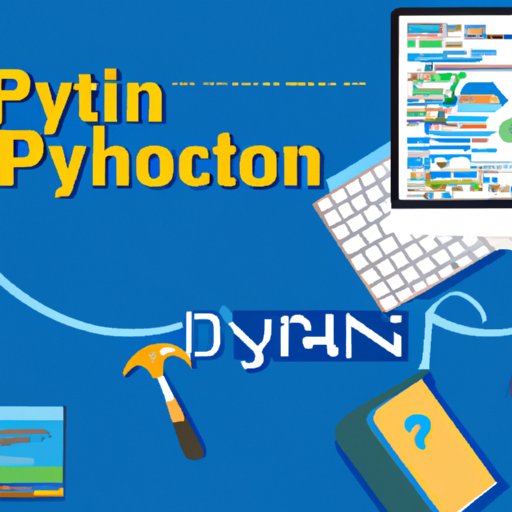Introduction
Programming languages are becoming an increasingly vital part of our daily lives. Whether you’re interested in a career in technology or simply want to learn a new skill, Python is an excellent language to invest your time in. Python is easy to learn, versatile, and has an incredibly supportive community. This article aims to provide you with a comprehensive guide to learning Python, highlighting its practical applications and the career opportunities it can provide.
A Beginner’s Guide to Learning Python
If you’re a beginner to programming concepts, it’s essential to establish the basics before diving into Python. Programming requires an understanding of algorithms, control structures, and program design. There are several resources on the internet that offer in-depth explanations of programming concepts. Some educational videos offer an introduction to computer science and programming on platforms such as edX and Coursera.
Once you have familiarized yourself with programming concepts, you’ll need to download an Integrated Development Environment (IDE) and the Python software. Use platforms such as Anaconda and Spyder, which offer both the IDE and software in one package. Once you have your IDE installed, it’s time to dive into Python!
Python has straightforward syntax and is widely regarded as one of the most comfortable languages to learn. Python’s simplicity allows you to concentrate on learning programming concepts without getting bogged down in syntax. When you begin learning Python, it’s best to start from scratch. Begin with basic arithmetic and logic operations, move on to data structures such as lists and dictionaries, and finally learn loops and control structures.
It’s essential to practice frequently when learning Python because practice makes perfect. There are different ways to enhance your learning experience, such as working through problem sets or taking on projects.
Learn Python by Doing
Learning Python can involve trying different projects that improve your skills. Such projects help you deal with real-life computer programming tasks. Begin with small, simple projects, such as creating a text-based calculator or a simple game. Once you gain confidence and experience, move on to more complex projects such as developing a web application or implementing a data visualization tool. Using project based learning will help you develop a portfolio of projects that you can showcase when you are in search of a job.
Projects enhance your learning experience by introducing the application of programming concepts. You’ll learn how different concepts interact with one another while working on a particular project. For example, you’ll learn how to use Python as a tool to scrape data from the internet and interact with APIs in a more complex project.
The Benefits of Learning Python
The practical applications of Python knowledge are as vast as they are impressive. Python’s versatility means that it can be applied in almost every industry, from healthcare and finance to engineering and entertainment. Python’s ability to be a significant player in the data analysis and data science fields makes it very relevant to today’s workplace. If you concentrate on these areas, you will be in demand, and your earning potential will increase significantly as many high-demand jobs place heavy emphasis on data analysis.
Furthermore, Python is one of the principal languages used in machine learning. The ability to work with machine learning can develop and lead to breakthroughs in technologies such as autonomous vehicles, computer vision, and speech recognition. Thus, learning Python can provide you with a springboard to a career in the most innovative areas of technology.
Learning Python through Online Courses
There are many online courses for Python geared towards helping beginners master a strong foundation in coding. Some platforms include edX, Coursera, Udemy, Code Academy, and Solo Learn, among others. It is essential to take time and select courses that meet your particular requirements. Look for courses with the best reviews, take a preview of the course material, confirm the instructor’s experience, and verify the course’s delivery format. If you prefer a more personalized approach, private coaching and mentorship is also an option, but may come with higher costs.
Online learning provides flexibility and affordability compared to traditional learning methods. In-person lectures and classes can be strenuous, and accessing the content can be challenging, especially if you have other commitments such as work or family. Online courses offer the flexibility to learn at your own pace and time, making it a more suitable alternative for many.
Python Learning Community
Learning Python using guidance from an expert and being part of a community make the learning process easier and much more enjoyable. There are several communities for Python users on the internet, from online forums to social networks. These communities offer a platform to ask questions, receive feedback, work on group projects and get general help. Some communities include GitHub, StackOverflow, Reddit’s Python community, DataRobot, LinkedIn groups, among others.
Some readers may prefer to join a local Python group where they can network with other programmers and attend hackathons or meetings. In-person communities provide a fantastic opportunity to share ideas, collaborate, and get feedback from experienced python users. You can get local Python groups by checking Meetup.com or by asking on your social media pages.
Conclusion
Learning Python can be a fun, engaging experience resulting in a wealth of knowledge that can lead to exciting career opportunities. This article has provided an essential guide for beginners who want to learn Python but don’t know where to start. We recommend starting with the basics of programming concepts before diving into Python. Upon mastering the basics, focus on other resources such as online courses, projects, and being part of a community that will complement and improve your skills. Start your journey by enrolling in a Python course today, and enjoy the experience to its fullest.
